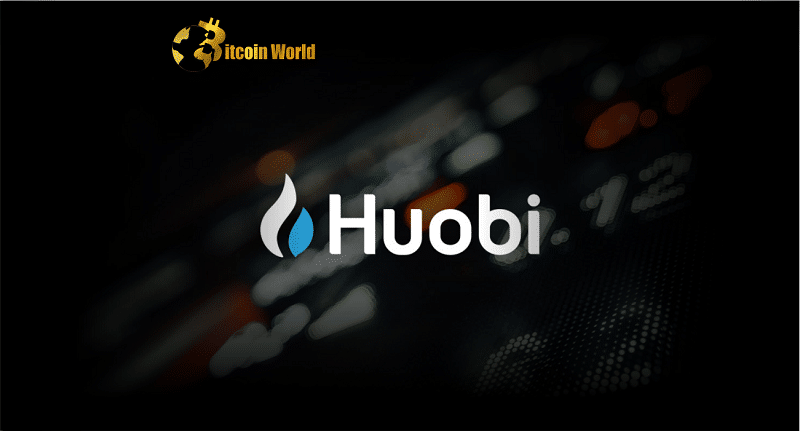In the fast-paced world of cryptocurrency, mergers and acquisitions are always a hot topic. But sometimes, the most interesting news is about deals that don’t happen. Recently, whispers have been circulating about a potential acquisition in the crypto exchange arena, specifically involving two major players: Binance and Huobi. So, what’s the scoop? Let’s dive into the details of why Binance, the world’s largest crypto exchange, reportedly turned down an offer to buy a stake in Huobi, a rival exchange linked to crypto personality Justin Sun.
Why Did Binance Decline Huobi? The China Factor
According to a report from an unidentified source, Binance decided to pass on the opportunity to acquire Justin Sun’s ownership position in Huobi. The reason behind this decision? Allegations surrounding Huobi’s connections to mainland China. Let’s break down why this is a significant factor:
- Regulatory Sensitivity: Binance, as a global exchange, operates in a complex regulatory landscape. Maintaining a squeaky-clean image and complying with international regulations is paramount for their continued success.
- Avoiding China Ties: The crypto environment in mainland China is, shall we say, complicated. The Chinese government has taken a stringent stance against cryptocurrency trading and mining. Binance, it seems, is keen to steer clear of any perceived close association with mainland China to avoid potential regulatory hurdles and reputational risks.
- Reputational Risk: Being linked to regions with uncertain or restrictive crypto policies can create negative perceptions among users and regulators globally. Binance likely wants to maintain its distance to safeguard its global operations and user trust.
Essentially, it boils down to Binance playing it safe in a world where regulatory scrutiny is only intensifying. Staying away from potential political or regulatory hotspots appears to be a strategic priority.
Justin Sun’s Huobi: What’s the Real Story?
Justin Sun, the well-known (and often talked about) Chinese entrepreneur, is a prominent figure in the crypto world. He’s best known for founding TRON, a blockchain platform focused on entertainment and content sharing. But his involvement with Huobi has been a subject of much speculation and discussion.
Here’s what we know, and what’s still a bit hazy:
- Sun’s Influence: While the exact nature of his ownership isn’t always crystal clear, it’s widely understood that Justin Sun wields significant influence, if not outright control, over Huobi. He’s often referred to as “the boss” within the company.
- Huobi’s Hong Kong Move: Sun seems aware of the concerns surrounding mainland China connections. He has publicly stated Huobi’s intention to launch Huobi Hong Kong and actively pursue licenses there. This move could be interpreted as an attempt to distance Huobi from mainland China and tap into a more crypto-friendly regulatory environment in Hong Kong.
- Denials and Speculation: Despite reports and rumors, Sun has denied actively seeking to sell his stake in Huobi recently. He even playfully dismissed sale rumors as an April Fool’s joke, reaffirming Huobi’s commitment to providing a “safe, reliable, and innovative” trading platform.
It’s a bit of a dance – denials and confirmations, rumors and official statements. The crypto world thrives on this kind of dynamic, but it can make it tricky to pinpoint the absolute truth.
Huobi: No Stranger to Acquisition Rumors
This isn’t the first time Huobi has found itself in the spotlight of acquisition speculation. Remember the FTX saga? Back in the day, even Sam Bankman-Fried, then CEO of FTX, publicly stated that he would not be acquiring Huobi. That feels like a lifetime ago in crypto years!
Going further back, Bloomberg reported in August that Leon Li, Huobi’s founder, was considering selling his majority stake. Potential buyers mentioned in those reports? You guessed it – Sam Bankman-Fried (again!) and Justin Sun himself. It’s a small world in the upper echelons of crypto exchanges, it seems.
Here’s a quick timeline to put things in perspective:
| Date/Period | Event/Rumor |
|---|---|
| August (Year Unspecified – likely 2022) | Bloomberg reports Leon Li considering selling majority stake in Huobi. SBF & Justin Sun mentioned as potential buyers. |
| Last Year (Likely 2022) | Sam Bankman-Fried states FTX will not acquire Huobi. |
| Recent Reports (Current News) | Binance reportedly turns down offer to acquire Justin Sun’s Huobi stake due to China links. |
What Does This Mean for the Crypto Exchange Landscape?
So, Binance said ‘no’ to Huobi. What’s the bigger picture here?
- Huobi’s Future: For Huobi, this could mean continuing on its current path, focusing on its Hong Kong expansion, and perhaps seeking other avenues for growth or investment. The exchange still holds a significant position in the market, and Justin Sun’s continued involvement suggests ongoing ambitions.
- Binance’s Strategy: Binance’s decision reinforces its cautious approach to regulatory complexities and geopolitical risks. It signals a clear priority for maintaining a global, regulation-compliant operation, even if it means passing on potential acquisition opportunities.
- Market Consolidation: While this particular deal didn’t materialize, the crypto exchange space is still ripe for consolidation. As regulations tighten and competition intensifies, we might see more strategic partnerships and acquisitions in the future – just perhaps not between these two giants right now.
In Conclusion: The Crypto World Keeps Turning
The dance between Binance and Huobi, or rather, the non-dance, highlights the intricate dynamics at play in the cryptocurrency world. Regulatory considerations, geopolitical factors, and the ever-present rumors all contribute to a constantly evolving landscape. While Binance might have passed on Huobi this time, the story of crypto exchange consolidation and strategic maneuvering is far from over. Keep watching this space – the next chapter is likely just around the corner!
Disclaimer: The information provided is not trading advice, Bitcoinworld.co.in holds no liability for any investments made based on the information provided on this page. We strongly recommend independent research and/or consultation with a qualified professional before making any investment decisions.




